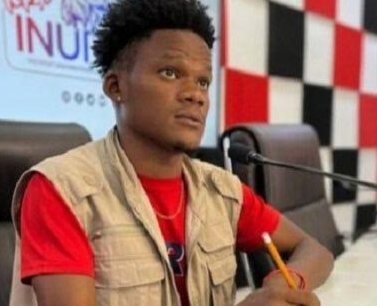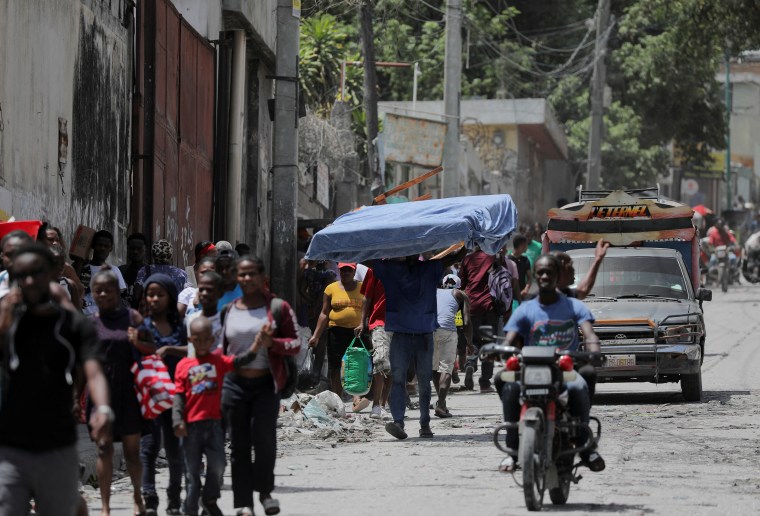Dumesky Kersaint never flinched when it came to investigating violence in his gang-controlled suburb of Haiti’s capital, Port-au-Prince. On the morning of April 16, the 31-year-old radio reporter left before dawn to cover a previous night’s shooting near his home in Carrefour-Feuilles. He never came back.
Several hours after setting out, Kersaint’s body was found in the street with a bullet in his forehead, sprawled next to another corpse believed to be a victim of the shooting Kersaint had set out to investigate.

Kersaint, a 31-year-old father to a baby daughter, worked for Radio-Télé INUREP, an online media outlet run by a local university. “He lived and breathed journalism, it was his entire life. That’s why we hired him,” Fabien Iliophène, the rector of INUREP university, told CPJ in an interview.
There is little chance that Kersaint’s killers will ever be brought to justice. Haiti is in crisis, its economy battered by natural disasters and gang violence. The July 2021 assassination of President Jovenel Moïse dashed any lingering hopes for a new democratic era more than three decades after the popular rebellion that ended the dictatorship of the Duvalier family in 1986. Moise’s assassination left a political void that allowed gangs to seize control of large parts of the capital and journalists forced to work in what lawyers and media experts say is a climate of almost total lawlessness. The result is a press corps that tries to report against all odds, but is often terrified into self-censorship.
Global Impunity Index 2023 Table of contents
Overall, some 3,000 people were murdered and more than a thousand kidnapped in the first nine months of this year, according to the United Nations. Law enforcement officials believe the country is home to around 200 gangs, which sometimes target journalists or threaten them over what they report.
Kersaint is one of at least five Haitian journalists murdered in direct reprisal for their work since Moise’s assassination. According to CPJ’s 2023 Global Impunity Index, their unsolved killings – along with a sixth murder in 2019 – have placed Haiti as the world’s third-worst country, behind Syria and Somalia respectively, when it comes to justice for murdered journalists over the past 10 years.
Radio-Télé INUREP news director Jacques-Antoine Bazile told CPJ that he believed Kersaint was killed in retaliation for his work. Witnesses told the university that Kersaint was photographing the crime scene when an unidentified man approached him and demanded he delete those photos.
“It was a deliberate and planned crime,” Bazile said. “It’s possible that he wanted to film the murder scene and, not wanting to give the camera away to nullify any possible trace of evidence, he was executed.”
The United Nations office in Haiti, BINUH, said in a recent report that impunity remains widespread in Haiti, with the judicial system plagued by corruption, political interference, and strikes, resulting in few being held accountable for the violence. With nowhere to turn, some Haitians have taken justice into their own hands, forming a movement known as Bwa Kale, or “peeled wood” to punish alleged gang members.
“I have never seen the situation as bad as it is now,” the U.N. Independent Expert on Haiti, William O’Neill, told CPJ after returning from a 10-day fact-finding trip to the country this summer.

Haiti’s National Police lacks the funds and resources to take on the gangs, with only an estimated 10,000 active officers serving a country of more than 11 million. In a last-ditch effort to restore security, the U.N. Security Council voted on October 2 to send a multinational armed force to Haiti for one year, though it is unclear how soon it will be deployed.
This summer, the gangs expanded their territorial control into residential neighborhoods such as Carrefour-Feuilles, where thousands of residents were forced to flee, in some cases after their homes were set afire. CPJ has documented the cases of several journalists who fled the area, including at least two who said their homes were destroyed by arson.
Gang violence has also spread to other parts of the country. In July, the owner and staff of Radio Antarctique in Liancourt, in Haiti’s central Artibonite region were forced to flee after gang members attacked the station, setting fire to its studios as part of an arson attack on the town. Police had fled the town weeks earlier and only recently returned, according to Radio Antarctique’s director and founder Roderson Elias. He told CPJ that the station remains off the air and gangs continue to control the town.
“We are on our own, helpless against the gangs,” said Elias, who has since left the country. “One day I would like to return, but right now we can’t count on our local authorities to protect us,” he added.
In addition to the five journalists murdered in connection with their work since the presidential assassination, CPJ has documented an additional four journalists killed in the same time period. (In one of the four cases, the death was work-related; in the others, CPJ is still trying to confirm whether the killings were related to journalism.)
One case, the fatal shooting by police of photojournalist Romelson Vilcin in October 2022 while covering a protest, resulted in a rare investigation by the Inspector General of the police, which sanctioned the officer involved with a three-month unpaid leave, according to National Police Inspector General Fritz Saint Fort. He told CPJ that his office recommended that law enforcement units receive training to be “more professional and respectful” in their dealings with citizens.
Vilcin’s death occurred a few days after an attack on another journalist, Roberson Alphonse, the news editor at the country’s oldest daily newspaper, Le Nouvelliste, who is also a radio and television journalist on Magik9 and Télé 20.
Alphonse survived what the Miami Herald described as an “apparent assassination attempt” while driving in the Delmas 40B neighborhood early in the morning of October 25, when his vehicle was hit by several bullets as he drove to work. He was shot in the chest, stomach, and arms, and spent eight days in hospital. He said he was questioned by police investigators about the attack while in hospital but heard nothing from authorities after that.
He has since left the country. “I have to go back, but I don’t know when it will be safe. I can’t allow anyone to silence my voice,” Alphonse told CPJ.
Multiple journalists have been kidnapped in recent months. CPJ spoke to several who were released and they said that they were not aware of police conducting investigations into the incidents.
Legal protections for journalists in Haiti have never been strong, but local journalists say they have never encountered a more dismal situation.
“The Haitian justice system has historically been ineffective in Haiti,” according to Widlore Mérancourt, editor-in-chief of online news site AyiboPost. He noted previous high-profile incidents involving journalists, like the still-unsolved 2000 killing of Jean Dominique or the 2018 disappearance of Vladjimir Legagneur. “However, the system is now facing an overwhelming crisis,” he told CPJ, saying the assassination of Moïse had pushed the country to the brink of total breakdown, including the judicial system.
“With no functioning parliament, gangs have taken control of entire courts, judges have fled the country for their safety, and court proceedings are irregular … which translates into more preventive detention, no thorough investigations and almost complete impunity for those who attack or kill members of the press,” said Mérancourt, who also reports for The Washington Post from Haiti.
In the case of Kersaint, several sources told CPJ that he was likely murdered because of his efforts to document a spate of recent crimes in Carrefour-Feuilles, a strategically located neighborhood hotly contested by rival gangs and the police.
Kersaint’s family members told CPJ they had not filed any legal complaint and had not been contacted by authorities after collecting his body from the morgue. They said they had no knowledge if any official investigation took place.
The university said it was also unaware of any official investigation into Kersaint’s murder. “Sadly, the security conditions in Carrefour today do not favor the pursuit of an inquiry,” said Iliophène.
Radio-Télé INUREP recently renamed its studio to honor its fallen journalist, including a plaque in his name, Iliophène told CPJ. The university, which has about 5,000 students, also plans to award an annual “Dumesky Kersaint Prize” for excellence in reporting.
Editor’s note: This article has been updated with a response from the the Inspector General of the police in the 16th paragraph.
